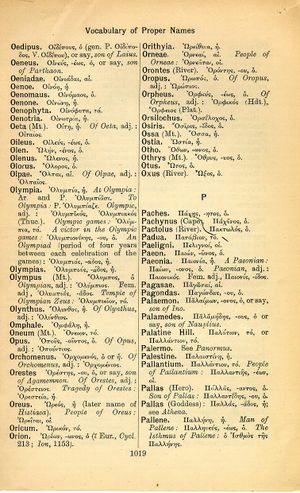Ostia: Difference between revisions
νεκρὸν ἐάν ποτ' ἴδηις καὶ μνήματα κωφὰ παράγηις κοινὸν ἔσοπτρον ὁρᾶις· ὁ θανὼν οὕτως προσεδόκα → whenever you see a body dead, or pass by silent tombs, you look into the mirror of all men's destiny: the dead man expected nothing else | if you ever see a corpse or walk by quiet graves, that's when you look into the mirror we all share: the dead expected this
(Names) |
(6_11) |
||
| Line 1: | Line 1: | ||
{{WoodhouseENELnames | {{WoodhouseENELnames | ||
|Text=[[File:woodhouse_1019.jpg|thumb|link={{filepath:woodhouse_1019.jpg}}]]Ὠστία, ἡ. | |Text=[[File:woodhouse_1019.jpg|thumb|link={{filepath:woodhouse_1019.jpg}}]]Ὠστία, ἡ. | ||
}} | |||
{{Lewis | |||
|lshtext=<b>Ostĭa</b>: ae, f., and Ostĭa, ōrum, n. [[ostium]]; cf. Engl. [[mouth]], in Ply-[[mouth]], Yar-[[mouth]], etc.,<br /><b>I</b> a [[seaport]] [[town]] in [[Latium]], at the [[mouth]] of the [[Tiber]], built by [[Ancus]] [[Marcius]], [[still]] called [[Ostia]]: Ostiam urbem ad exitum [[Tiberis]] in [[mare]] fluentis [[Ancus]] [[Marcius]] rex condidisse fertur, Paul. ex Fest. p. 197 Müll.; cf.: [[urbs]], [[quam]] [[secundum]] [[ostium]] [[Tiberis]] ([[Ancus]] [[Marcius]]) posuit, ex quo [[etiam]] Ostiam. id. s. v. Quiritium, p. 254 ib.; Enn. ap. Paul. ex Fest. s. v. [[quaeso]], p. 258 ib. (Ann. v. 145 Vahl.): in [[ore]] [[Tiberis]] [[Ostia]] [[urbs]] condita, Liv. 1, 33 fin.; Cic. Rep. 2, 3, 5.—Form [[Ostia]], ōrum, Liv. 9, 19, 4; 23, 37, 1.—Hence,<br /><b>II</b> Ostĭen-sis, e, adj., of or belonging to [[Ostia]], Ostian ([[class]].): [[Ostiensis]] [[ager]], Cic. Att. 12, 23, 3; Liv. 8, 12: [[populus]], id. 27, 38: [[quaestor]] (L. [[Saturninus]]), Cic. Sest. 17, 39: [[portus]], Plin. 9, 6, 5, § 14: [[provincia]], the [[duty]] of one of the quœstors to [[superintend]] the aqueducts [[leading]] to [[Rome]], and the supplying of [[Rome]] [[with]] [[corn]], Cic. Mur. 8, 18; Suet. Claud. 24: [[incommodum]], the [[capture]] of the Roman [[fleet]] by pirates at [[Ostia]], Cic. Imp. Pomp. 12, 33. | |||
}} | }} | ||
Revision as of 08:44, 13 August 2017
English > Greek (Woodhouse)
Ὠστία, ἡ.
Latin > English (Lewis & Short)
Ostĭa: ae, f., and Ostĭa, ōrum, n. ostium; cf. Engl. mouth, in Ply-mouth, Yar-mouth, etc.,
I a seaport town in Latium, at the mouth of the Tiber, built by Ancus Marcius, still called Ostia: Ostiam urbem ad exitum Tiberis in mare fluentis Ancus Marcius rex condidisse fertur, Paul. ex Fest. p. 197 Müll.; cf.: urbs, quam secundum ostium Tiberis (Ancus Marcius) posuit, ex quo etiam Ostiam. id. s. v. Quiritium, p. 254 ib.; Enn. ap. Paul. ex Fest. s. v. quaeso, p. 258 ib. (Ann. v. 145 Vahl.): in ore Tiberis Ostia urbs condita, Liv. 1, 33 fin.; Cic. Rep. 2, 3, 5.—Form Ostia, ōrum, Liv. 9, 19, 4; 23, 37, 1.—Hence,
II Ostĭen-sis, e, adj., of or belonging to Ostia, Ostian (class.): Ostiensis ager, Cic. Att. 12, 23, 3; Liv. 8, 12: populus, id. 27, 38: quaestor (L. Saturninus), Cic. Sest. 17, 39: portus, Plin. 9, 6, 5, § 14: provincia, the duty of one of the quœstors to superintend the aqueducts leading to Rome, and the supplying of Rome with corn, Cic. Mur. 8, 18; Suet. Claud. 24: incommodum, the capture of the Roman fleet by pirates at Ostia, Cic. Imp. Pomp. 12, 33.

